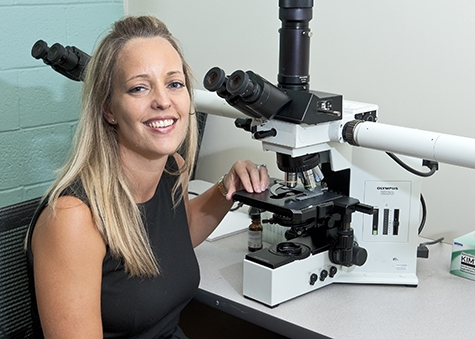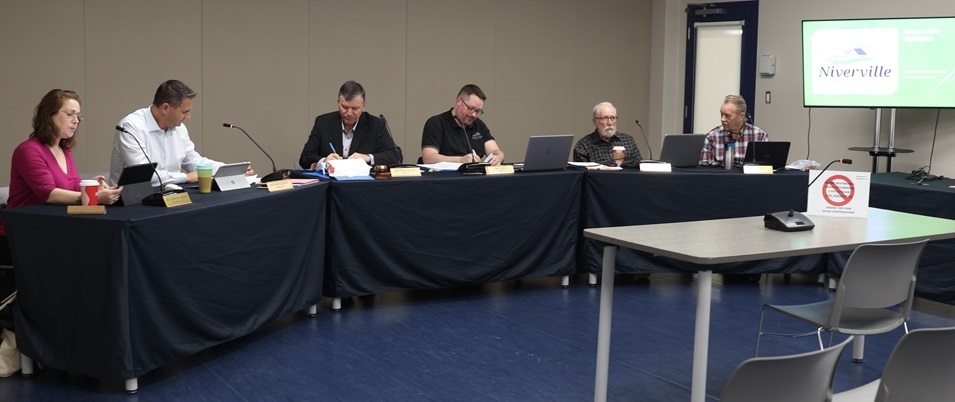
When Dr. Trish Simner was a young woman growing up in Ste. Agathe, she didn’t think much about leaving her hometown one day, let alone her province. Yet all these years later, she’s more than left Manitoba; she’s moved with her family across the continent, where she’s achieving big things as the Director of Medical Bacteriology and Parasitology Laboratories at John Hopkins Hospital in Baltimore, Maryland.
If the name “John Hopkins” sounds familiar, that’s because it’s frequently name-checked in movies and in television. The world-renowned centre of medicine and scientific research has been the birthplace of many medical specialities. Not only was it the first major medical school in the United States to admit women, but it was the first facility to develop renal dialysis, CPR, and the use of rubber gloves for surgical procedures.
It’s the perfect venue for a career in groundbreaking research, and Simner feels right at home. As a clinical microbiologist, she’s a specialist in antibiotic-resistant bacteria, a recent phenomenon that’s making life difficult for both doctors and patients around the world.
“Currently, we encounter the rare patient that has an infection caused by a difficult to treat organism where there are few treatment options,” says Simner. “Luckily this is still a rare event in the U.S. and Canada. The best-case scenario is that we find solutions to prevent the spread of these multidrug-resistant organisms before they become a bigger problem.”
Simner says that ideally we need to see a global initiative to restrict the use of antibiotics and employ them more judiciously.
“Inappropriate antibiotic use is the driver of resistance in these organisms,” she says. “The organisms are smart and always find ways to evolve to evade even the most potent antibiotics. Thus, we need to restrict the use of antibiotics for when they are really needed. The worst-case scenario would be that we continue to use antibiotics inappropriately… Ultimately, these organisms could spread and become a larger problem.”
This should be a concern for everyone, as we are all dependent on the use of antibiotics at key points in our lives. In the modern world, we’ve grown accustomed to being able to easily treat everything from strep throat to pneumonia, urinary tract infections to a host of sexually transmitted infections. Without antibiotics, these conditions would be much more fatal. It was only the invention of penicillin in 1928, and the beginning of its use to fight infections in 1942, that these conditions could be reliably treated. Many forms of surgery, from life-saving organ transplants to more common appendectomies, are only possible because of effective antibiotics.
“It is becoming more and more difficult,” Simner says. “When we encounter patients with multidrug-resistant infections, we try our best to find an antibiotic, or a combination of antibiotics, that will help the patient overcome the infection. Furthermore, there are very few new antibiotics being developed, so we need to use the ones we have available appropriately or we might find ourselves in a place where there will be no options for treatment.”
According to Simner, it’s critically important to use antibiotics sparingly and only in appropriate ways. A good example of this is the common misperception among the public that it’s helpful to treat viruses with antibiotics. Viruses, such as the strain of flu which has been so rampant this winter, do not respond to antibiotics.
“This is a prime example of the inappropriate use of antibiotics,” Simner says. “Antibiotics do not treat viruses. Oftentimes people get a viral infection, such as influenza, and they feel horrible and think that antibiotics are the answer. They will go to their physician and demand antibiotics. But the antibiotic is not helpful.”
Colistin Research
Simner is at the forefront of research to develop a method of testing the antimicrobial susceptibility of an antibiotic known as colistin against Gram-negative bacteria.
If you have a hard time unpacking this, you’re not alone.
“In the Clinical Microbiology Laboratory, we grow and identify the organisms that cause infections,” she begins, breaking down the purpose of the laboratory where she works. “For example, if you have a urinary tract infection, we will take a sample of the urine and grow the organism causing the infection. We will also perform antibiotic susceptibility testing, which is a method where we determine what antibiotics the organism will respond to for treatment.”
Her research focuses on colistin, an antibiotic of last resort, meaning that physicians will only use this drug if there are no other options available to them. But they don’t want to rely on colistin unless they’re quite certain it will work. That’s what susceptibility testing is all about: figuring out if a treatment will be effective against a particular infection.
The research focuses on reviving an old method that first emerged in the 1970s: the colistin broth disk elusion test. Antibiotic disks—disks impregnated with colistin at set concentrations—are placed in broth to achieve different concentrations of the antibiotic to determine whether the organism is susceptible or resistant to colistin.
“We hope that this method will provide an easy method for clinical labs to be able to test colistin susceptibilities when needed rather than having to send testing out to reference laboratories, which can delay results,” Simner explains. “This technique will help fight antibiotic-resistant infections by providing the physicians with an answer on whether they can treat the organism with this antibiotic or not.”
Most importantly, this kind of research has the potential to save thousands of lives. And that’s something Simner never forgets.
Humble Beginnings
Simner was recently honoured by the University of Manitoba’s Faculty of Science, her alma mater, for her contributions to science. She was one of seven outstanding alumni to be recognized at the February 1 event.
After graduating with a Ph.D. from the University of Manitoba in 2011, Simner spent two years of post-doctorate study at the Mayo Clinic in Rochester, Minnesota. Afterward she briefly worked as a clinical microbiologist in Winnipeg, at St. Boniface Hospital, and taught in the University of Manitoba’s Department of Medical Microbiology as an assistant professor. Her stint at John Hopkins began in 2015.
“I enjoy many aspects of my job,” she says of her time at John Hopkins. “I love the fact that I have the ability to work in the clinical lab, perform research, and teach the next generation of medical professionals. The most rewarding part is knowing that my work has the ability to positively impact patient care.”
Simner wants young people to know that it’s possible to use their passion and interests to achieve ambitious and meaningful things in life.
“Once you’ve found your passion, set big goals for yourself,” she advises. “Surround yourself with a good support system. Apply for the opportunities—summer research awards, getting work experience in your field. And volunteer, get to know your peers and your community. Find yourself a good mentor. This will all be lots of hard work, but it’s worth it!”
Perhaps most importantly, she says her career wouldn’t have been possible without the support system she had in place throughout her education and early career.
“I want to thank my parents, Richard and Gloria Baudry, for always being there and supporting me. I’m also very appreciative and grateful for my husband, Matt Simner, who has made a lot of sacrifices for my career. Lastly, I want to thank my friends, family, and the community of Ste. Agathe for their encouragement. Being from a small town in ‘friendly Manitoba’ has taught me to always be nice, approachable, and accepting. I think these attributes have benefitted me throughout my career. I’m a proud Ste. Agathan and have always felt so fortunate to have such a wonderful community that supports me.”


















